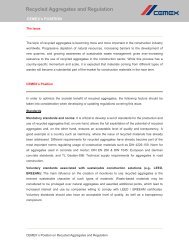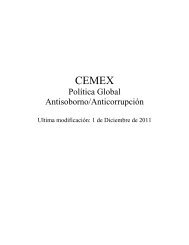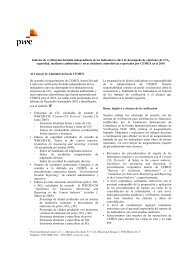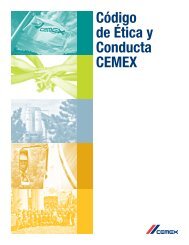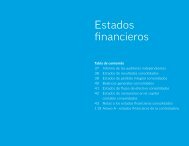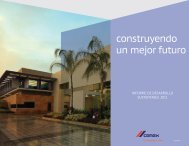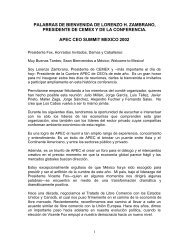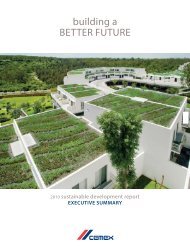building a STRONGER foundation - Cemex
building a STRONGER foundation - Cemex
building a STRONGER foundation - Cemex
Create successful ePaper yourself
Turn your PDF publications into a flip-book with our unique Google optimized e-Paper software.
CEMEX, S.A.B. DE C.V. AND SUBSIDIARIES<br />
Notes to the Consolidated Financial Statements – (Continued)<br />
As of December 31, 2010, 2009 and 2008<br />
(Millions of Mexican pesos)<br />
In addition, the government of Venezuela has claimed that three cement transportation vessels, transferred before the expropriation of<br />
CEMEX Venezuelan operations, continue to be the property of the former CEMEX Venezuela, and obtained interim measures before a<br />
Venezuelan court barring further transfer or disposition of the vessels. The government of Venezuela attempted to enforce this interim<br />
measure in the courts of Panama, and on November 2010, the Panamanian Supreme Civil Court’s confirmed its prior rejection of such<br />
attempt to give the Venezuelan interim measures legal effect in Panama. The appropriate affiliates of CEMEX will continue to resist any<br />
further efforts by the government of Venezuela to assert ownership rights over the vessels.<br />
In July 2008, Strabag SE (“Strabag”), one of the leading suppliers of <strong>building</strong> materials in Europe, entered into a Share Purchase<br />
Agreement (“SPA”) to purchase CEMEX’s operations in Austria and Hungary for €310 (US$413 or Ps5,105), subject to authorization of<br />
the competition authorities in Hungary and Austria. On July 1, 2009, Strabag notified CEMEX of its purported rescission of the SPA,<br />
arguing that the regulatory approvals were not obtained before June 30, 2009. In October 2009, CEMEX filed a claim against Strabag<br />
before the International Arbitration Court of the International Chamber of Commerce (“ICC”), requesting a declaration that Strabag’s<br />
rescission of the SPA was invalid and claiming the payment of damages caused to CEMEX for the alleged breach of the SPA for €150<br />
(US$200 or Ps2,472). In December 2009, Strabag requested the tribunal to dismiss the claim and also filed a counterclaim for the payment<br />
of damages and applied for security for costs related to the arbitration proceedings for an aggregate amount of approximately €2 (US$3 or<br />
Ps33). The security for costs application was withdrawn by Strabag in March 2010. The arbitration tribunal was constituted on February<br />
16, 2010, and a first procedural hearing was held on March 23, 2010 at which parties agreed on the terms of reference and procedural rules<br />
in accordance to ICC Rules of Arbitration. On June 30, 2010, CEMEX submitted its statement of claim and its list of witnesses. On<br />
October 29, 2010, Strabag submitted its statement of defense and counterclaim. CEMEX believes Strabag’s counterclaim to be unfounded.<br />
In 2002, CEMEX Construction Materials Florida, LLC (“CEMEX Florida”), one of CEMEX’s subsidiaries in the United States, was<br />
granted one federal quarry permit that covered the SCL and FEC quarries, and was the beneficiary of another federal quarrying permit for<br />
the Lake Belt area in South Florida, which covered the Kendall Krome quarry. In response to litigation brought by environmental groups<br />
concerning the manner in which the federal quarry permits were granted, in January 2009, a judge from the U.S. District Court for the<br />
Southern District of Florida ordered the withdrawal of the federal quarry permits of CEMEX’s SCL, FEC and Kendall Krome quarries. The<br />
judge ruled that there were deficiencies in the procedures and analysis undertaken by the relevant governmental agencies involved with the<br />
issuance of the permits. On January 29, 2010, in connection with the withdrawal of federal quarry permits in Lake Belt, Florida, the Army<br />
Corps of Engineers concluded a revision related to the court’s ruling in 2006 and determined procedures for granting new federal quarry<br />
permits in the area. During February 2010, new quarry permits were granted to the SCL and FEC quarries. However, at December 31,<br />
2010, a number of potential environmental impacts must be addressed before a new federal quarry permit may be issued for mining in the<br />
Kendall Krome quarry. If CEMEX Florida were unable to maintain the new Lake Belt permits, CEMEX Florida would need to source<br />
aggregates, to the extent available, from other locations in Florida or import aggregates. This would likely affect operating income from<br />
CEMEX’s Florida operations. Any adverse impacts on the Florida economy arising from the cessation or significant restriction of<br />
quarrying operations in the Lake Belt area could also have a material adverse effect on our financial results.<br />
In April 2006, the cities of Kaštela and Solin in Croatia published their respective development master plans, adversely impacting the mining<br />
concession granted to a CEMEX’s subsidiary in Croatia by the Croatian government in September 2005. In May 2006, CEMEX filed an appeal<br />
before one constitutional court seeking a declaration by the court of its rights and seeking prohibition of the implementation of the master<br />
plans. The municipal courts in Kaštela and Solin had previously rejected the appeals presented by CEMEX. These resolutions were appealed.<br />
These cases are currently under review by the Constitutional Court in Croatia, and it is expected that these proceedings will continue for several<br />
years before resolution. During the proceedings, the Administrative Court in Croatia ruled in favor of CEMEX, validating the legality of the<br />
mining concession granted by the government of Croatia. This decision was final. However, CEMEX expects a resolution from the<br />
Constitutional Court to determine if the cities of Kaštela and Solin, within the scope of their master plans, can unilaterally change the borders of<br />
exploited fields. Currently, it is difficult to determine the impact on CEMEX as a result of the Kaštela and Solin proceedings.<br />
In addition, as of December 31, 2010, there are various legal proceedings of minor impact that have arisen in the ordinary course of business.<br />
These proceedings involve: 1) product warranty claims; 2) claims for environmental damages; 3) indemnification claims relating to<br />
acquisitions; 4) claims to revoke permits and/or concessions; and 5) other diverse civil actions. CEMEX considers that in those instances in<br />
which obligations have been incurred, CEMEX has accrued adequate provisions to cover the related risks. CEMEX believes these matters<br />
will be resolved without any significant effect on its business or results of operations.<br />
As of December 31, 2010, the tax returns submitted by some subsidiaries of CEMEX located in several countries are under review by the<br />
respective tax authorities in the ordinary course of business. CEMEX cannot anticipate if such reviews will result in new tax assessments,<br />
which, should any exist, would be appropriately disclosed and/or recognized in the financial statements.<br />
F-58



